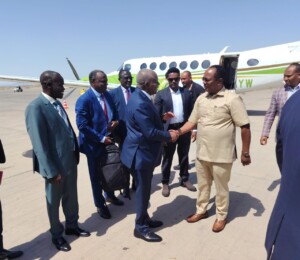Khartoum bridges and roads closed
The authorities in Khartoum closed all bridges in the city and the roads leading to the army command. They want to prevent the demonstrators of today’s March of the Millions from setting-up a new sit-in in downtown Khartoum.
 Demonstrators crossing the bridge to Khartoum on the first March of the Millions on June 30, 2019 (RD correspondent)
Demonstrators crossing the bridge to Khartoum on the first March of the Millions on June 30, 2019 (RD correspondent)
The authorities in Khartoum closed all bridges in the city and the roads leading to the army command. They want to prevent the demonstrators of today’s Marches of the Millions from setting-up a new sit-in in downtown Khartoum.
The marches commemorate the October 1964 Revolution and are organised by the Sudanese Professionals Association and the Resistance Committees.
Protests against the regime of President Omar Al Bashir, which began in December 2018, culminated in a massive sit-in in front of the army command in Khartoum on April 6 last year. Al Bashir was ousted in a military coup on April 11.
When the new military rulers did not seem willing to surrender power, the sit-in continued, calling for a civilian government. The sit-in was violently dispersed on June 3, at the end of the Ramadan. More than 127 people were reportedly killed.
A month after his appointment on August 21, Prime Minister Abdallah Hamdok formed an investigation commission into the dismantling of the sit-in. The commission has not yet presented any report.
SPA
In a statement on Friday, the Sudanese Professionals Association (SPA), the driving force behind the 2018 uprising, expressed its support for the October 21 marches.
The performance of the current government is “troubled and weak”, the SPA said, because the quality of life in Sudan is now intolerable. “We support the people’s anger at the results of the policies of the transitional government. We welcome demonstrations on October 21 to evaluate the transitional government.”
The SPA called on the transitional government “to change before it is too late”. Prime Minister Hamdok said in June that he would “set the transitional period back on course”.

First Marches of the Millions
On June 30, 2019, hundreds of thousands of Sudanese demonstrated in the first Marches of the Millions to demand civilian rule and justice for the slain demonstrators during the December Revolution, and especially the violent dismantling of the Khartoum sit-in on June 3 last year.
The Forces for Freedom and Change had called for this demonstration. Ten demonstrators were killed. The bridges between Omdurman and Khartoum were closed by security forces during the first Marches of the Millions, but demonstrators managed to break through.
In August 2020, Resistance Committees organised Marches of the Millions “to correct the course of the revolution”. Thousands took the streets in Khartoum and other cities to protest.
Resistance Committees
The Sudanese Resistance Committees Coordination issued a press statement yesterday in which they urge the government to step down. A new government is to be formed “based on true efficiency standards, not on partisan quotas”.
The Resistance Committees further demand the immediate dismissal of all military and civilian officials in the states who were appointed by the former regime, the Minister of Interior Affairs, the director general of the police, and the Khartoum state police chief.
They also demand “the immediate dissolution of all irregular militias, the complete dismantling of the Islamic Movement's security apparatus, and the formation of an intelligence apparatus which work is limited to collecting and analysing information”.
Companies owned by security officials must be confiscated and its assets handed over to the Ministry of Finance.
A High Judicial Council* is to be established as soon as possible. This council must then immediately select new members for the Constitutional Court and announce the results of the committee of inquiry into the June 3 sit-in massacre.
Furthermore, the Resistance Committees seek an immediate investigation into the killing of protestors. The perpetrators must be brought to justice.
El Gedaref
The Resistance Committees of El Gedaref in eastern Sudan at a press conference yesterday called for economic reforms, more efforts to combat corruption, and the confiscation of companies owned by the security and military.
A national Legislative Council must be formed as soon as possible and the judicial system must be restructured.
The Resistance Committees reject a unification of the three eastern Sudanese states Red Sea state, Kassala, and El Gedaref.
National Consensus Forces
In Khartoum, the National Consensus Forces (NCF, a coalition of opposition parties formed during the regime of ousted President Omar Al Bashir) announced it will participate in today’s marches. The NCF called on all Sudanese “to actively participate in the marches to protect the revolution and correct its current course”.
The NCF demands basic commodities continue to be subsidised, as advocated by the Economic Committee of the Forces of Freedom and Change. It also seeks the nationalisation of all companies and institutions belonging to the military and the security apparatus.
The Marches of the Millions should further call for the removal of the remnants of the Al Bashir empowerment** programme, combating corruption, expediting the prosecution of leaders of the ousted regime, establishment of the Legislative Council and new local government institutions, and investigations into the killings of protestors during the December Revolution.
The NCF said the government must adhere to the provisions of the current Constitutional Document. Changes to that document, which regulates how Sudan is governed in the transitional period, can only be made by Parliament. The government must also reach a comprehensive peace that includes all parties, stops the war, and addresses the roots of all problems that caused the war.
'Not doing well'
Yasir Arman, Vice President of the Sudan People’s Liberation Movement-North under the leadership of Malik Agar (SPLM-N Agar) in Blue Nile state and head of the Sudan Revolutionary Front (SRF) rebel alliance delegation in Khartoum, supports today’s Marches.
In a statement he said yesterday that the transitional government and other institutions in Sudan are “not doing well” at the moment. “However, the solution is not to remove them, but rather to develop and improve them. Calling for their overthrow will only serve the remnants of the former regime.”
* The formation of a High Judicial Council is also one of the demands of the respondents to a poll conducted by the Radio Dabanga Opinion Forum earlier this month. The survey showed that only eight per cent of the participants has confidence in the Sudanese judicial system.
** The Empowerment Elimination, Anti-Corruption, and Funds Recovery Committee was established by the new government in the end of last year, with the aim to purge Sudan of the remnants of the Al Bashir regime. Empowerment (tamkin) is the term with which the ousted government of Omar Al Bashir supported its affiliates in state affairs by granting them far-going privileges, including government functions and the setting-up of various companies.
Radio Dabanga’s editorial independence means that we can continue to provide factual updates about political developments to Sudanese and international actors, educate people about how to avoid outbreaks of infectious diseases, and provide a window to the world for those in all corners of Sudan. Support Radio Dabanga for as little as €2.50, the equivalent of a cup of coffee.












 and then
and then